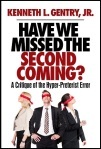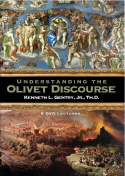ENDURING THE HYPERPRETERIST CONTAGION
PMW 2025-092 by Kenneth L. Gentry, Jr.
Along with many evangelical Christian leaders, I am deeply concerned with the small, but growing number of people defecting from the orthodox Christian faith by adopting Hyperpreterism. Simultaneously though, I am greatly encouraged by the number of emails and personal contacts I receive from folks who say my writings had helped them escape the addiction of Hyperpreterism.
THE SAD PROBLEM
I often receive worried emails from family members having to endure the Hyperpreterism addiction in a loved one. One recent email lamented their spouse’s attraction to Hyperpreterism. The writer asked how they might best be able to respond to their spouse’s theological error.
Of course, this is not something that can be quickly dealt with in one article — or even several. Such is the permeating nature of Hyperpreterism and its tendency to cause theological rot in someone who formerly was an orthodox believer in Christ. But my quick response to my correspondent was as follows (though the following is slightly edited).
Have We Missed the Second Coming:
A Critique of the Hyper-preterist Error
by Ken Gentry
This book offers a brief introduction, summary, and critique of Hyper-preterism. Don’t let your church and Christian friends be blindfolded to this new error. To be forewarned is to be forearmed.
For more Christian educational materials: www.KennethGentry.com
I have been amazed at how addictive toying with Hyperpreterism can be. Once they get the idea in mind, it seems to take the victim in all different directions — even leading to corruption of the doctrine of Christ. For example, they deny the continuing incarnation of Christ, holding that Christ’s resurrected body vanished after the ascension, being replaced by a spiritual body. Thus, Christ was only united with us for 30 years of his earthly experience, despite his incarnation being a key factor in his ongoing mediatorial role representing us to the Father (e.g., Col. 2:9; 1 Tim. 2:5).
In addition, HPs believe that God will have to endure a rebellious creation for eternity, since all prophecy has been fulfilled so that we must expect all things to continue forever as they are now. On and one I could go highlighting the many doctrinal errors created by Hyperpretists.
[image error]Why I Left Full-Preterism (by Samuel M. Frost)
Former leader in Full Preterist movement, Samuel M. Frost, gives his testimony and theological reasoning as to why he left the heretical movement. Good warning to others tempted to leave orthodox Christianity.
See more study materials at: KennethGentry.com
A HELPFUL BEGINNING
One place to begin exposing their error is with their denial of the future bodily resurrection of believers. And the best place to do that is one place where they make their biggest mistakes: 1 Cor. 15. They think “spiritual body” speaks of the composition material of the resurrected body, whereas it actually speaks of the Holy Spirit’s perfect control of the resurrected believer. If you have the time and can expend the effort, I would highly recommend reading James Ware’s The Final Triumph of God. It is written on a scholarly level, but even the non-scholar can see the powerful nature of his argument for a physical resurrection.
You might want to check out my presentation of the Foreword to Ware’s book at:
You should also read my three-part series on 1 Cor 15 and Hyperpreterism, noting how it undermines the very gospel of our salvation:
I would also recommend reading:
Understanding the Olivet Discourse 
By Ken Gentry
This 5 DVD lecture set was filmed at a Bible Conference in Florida. It explains the entire Olivet Discourse in Matt. 24–25 from the (orthodox) preterist perspective. This lecture series begins by carefully analyzing Matt. 24:3, which establishes the two-part structure of the Discourse. It shows that the first section of the Discourse (Matt. 24:4–35) deals with the coming destruction of the temple and Jerusalem in AD 70. This important prophetic event is also theologically linked to the Final Judgment at the end of history, toward which AD 70 is a distant pointer.
For more educational materials: www. KennethGentry.com
A THEOLOGICAL FAILURE
One serious problem HPs have (among many) is their not understanding the Already/Not Yet principle of biblical theology. They do not realize the biblical logic behind the fact we already possess in principle the glory of the future fullness of salvation. That is, we are now new creations in anticipation of the ultimate new creation, we now enjoy the spiritual resurrection in anticipation of the ultimate physical resurrection (note how Christ links the two in John 5:25-29), we now enjoy sanctification, in anticipation of the ultimate perfection of sanctification, we now enjoy eternal life (though we will die!) in anticipation of the ultimate securing of permanent, full eternal life, we are now justified in anticipation of our ultimate final, full justification at the final judgment. Etc., etc.
As the writer of Hebrews notes, we “have tasted the good word of God and the powers of the age to come” (Heb. 6:5), though we have not received the full final power of the eternal order.
There are so many problems in the HP hermeneutic that leads to an HP theology. Partial preterism is a hermeneutical tool required in certain, select passages of Scripture. Hyperpreterism is a whole new, unorthodox theology that continually gets worse over time. This is especially due to its mutating under the direction of largely untrained theolouges musing over the several preterist texts and extrapolating a new theological construct from them.
Keep studying! And don’t cast out 2000 years of Christian orthodox belief for this new, wholesale reconstructing of theology.
Kenneth L. Gentry Jr.'s Blog
- Kenneth L. Gentry Jr.'s profile
- 86 followers



